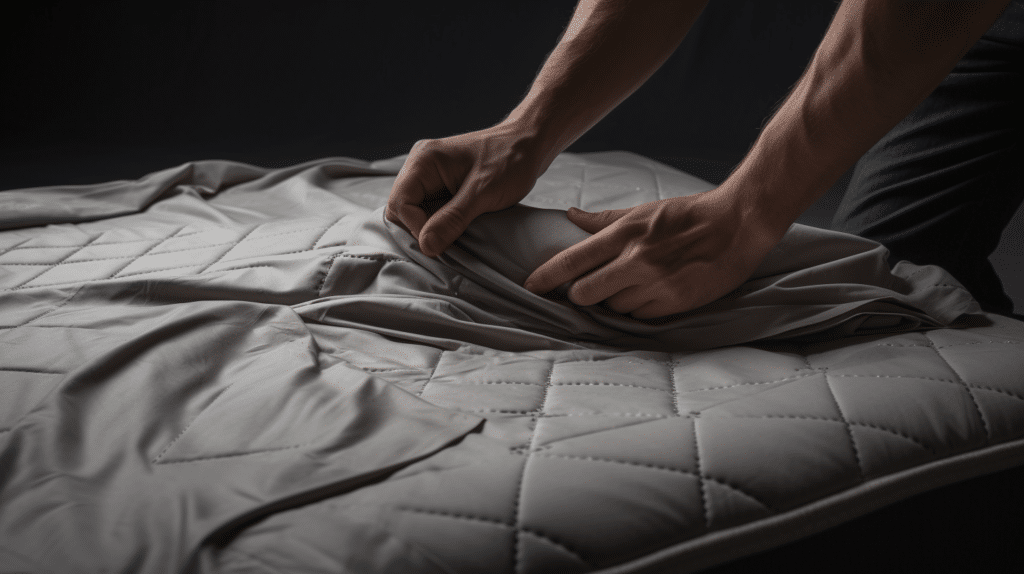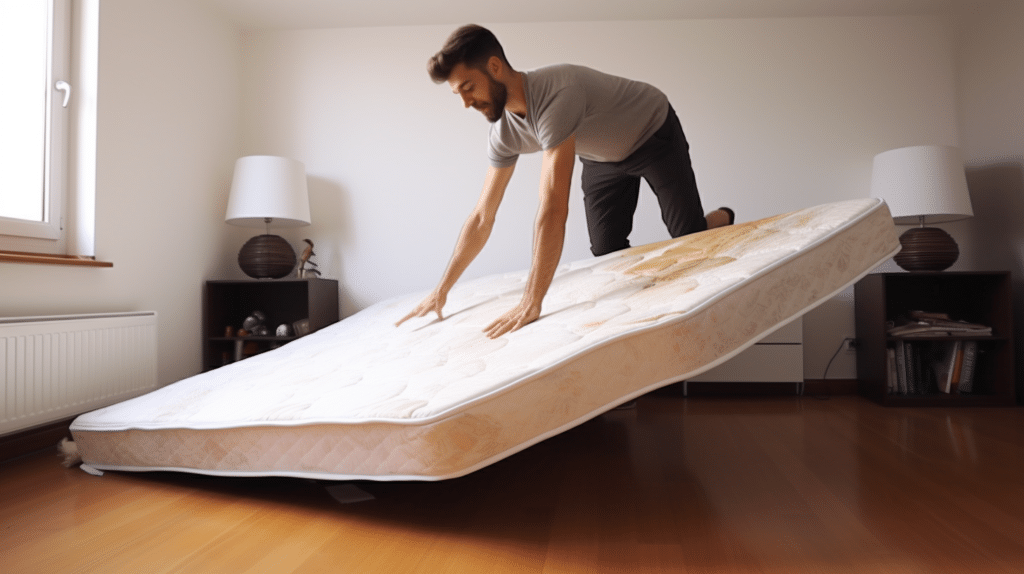Are you curious about the bamboo mattress phenomenon? In this article, we take a closer look at why these mattresses have been gaining popularity in the bedding industry. Discover the benefits of sleeping on a bamboo mattress and learn about any drawbacks to consider. We also explore the eco-friendly nature of bamboo mattresses and compare them to other environmentally friendly bedding options. If you’re thinking of investing in a bamboo mattress, we provide tips for choosing the best one for your needs and address common misconceptions. Find out if the bamboo mattress is worth all the hype!
The Rise of Bamboo Mattresses in the Bedding Industry
If you’re looking for a mattress that’s both eco-friendly and comfortable, you should definitely consider bamboo mattresses. The rise of bamboo mattresses in the bedding industry can be attributed to their durability and affordability. Bamboo is known for its strength, making it an excellent material for mattress construction. It can withstand regular use without losing its shape or support, ensuring a long-lasting investment. Additionally, bamboo mattresses are often more affordable compared to other types of mattresses on the market. This makes them an attractive option for budget-conscious consumers who still want quality and comfort. With the increasing demand for sustainable products, bamboo mattresses have gained popularity as a greener alternative in the bedding industry without compromising on durability or cost-effectiveness.
Benefits of Sleeping on a Bamboo Mattress
One of the benefits of sleeping on a bamboo mattress is that it can help regulate body temperature throughout the night. Bamboo fibers have natural moisture-wicking properties, allowing them to absorb and evaporate sweat quickly, keeping you cool and comfortable. Additionally, bamboo mattresses offer several other benefits for sleep quality:
- Pressure Relief: The natural elasticity of bamboo fibers provides excellent support and helps relieve pressure points, reducing pain and discomfort.
- Hypoallergenic: Bamboo mattresses are resistant to dust mites and mold, making them a great option for allergy sufferers.
- Durability and Longevity: Bamboo is known for its strength and durability. A bamboo mattress can withstand years of use without sagging or losing its shape.
By choosing a bamboo mattress, you can experience improved sleep quality while enjoying the added benefits of durability and longevity.
Drawbacks to Consider with Bamboo Mattresses
To fully consider the drawbacks of sleeping on a bamboo mattress, you should be aware of potential issues that may affect your overall sleep experience. One concern to keep in mind is the misleading marketing surrounding bamboo mattresses. While they are often advertised as being eco-friendly and natural, many bamboo mattresses are actually made from a blend of synthetic materials and only contain a small percentage of bamboo fibers. This can lead to disappointment if you were expecting a completely organic product. Additionally, durability concerns have been raised about bamboo mattresses. Some users have reported sagging or indentations after only a short period of use, which can be frustrating considering the investment made in purchasing the mattress. It’s important to carefully research and read reviews before making a decision to ensure that you choose a high-quality bamboo mattress that meets your expectations.
Understanding the Eco-friendly Nature of Bamboo Mattresses
When it comes to understanding the eco-friendly nature of bamboo mattresses, there are three key points to consider. First, sustainable sourcing and harvesting practices ensure that bamboo is grown and harvested responsibly, without causing harm to the environment. Second, bamboo mattresses are biodegradable, meaning they can naturally decompose over time without leaving a lasting impact on the planet. Lastly, these mattresses require reduced chemical usage in production compared to other types of mattresses, making them a more environmentally friendly choice.
Sustainable Sourcing and Harvesting Practices
Sustainable sourcing and harvesting practices play a crucial role in the bamboo mattress phenomenon. When it comes to bamboo mattress sustainability, it’s important to understand how the bamboo is sourced and harvested. Bamboo is known for its fast growth rate and ability to regenerate quickly, making it a highly renewable resource. To ensure sustainability, bamboo used for mattresses is often sourced from responsibly managed plantations that follow strict environmental guidelines.
In addition to being sustainable, bamboo mattresses also offer durability. The strong fibers of bamboo make it resilient and long-lasting, ensuring that your mattress will stand the test of time. By choosing a bamboo mattress, you’re not only making an eco-friendly choice but also investing in a product that will provide comfort and support for years to come.
By supporting sustainable sourcing and harvesting practices, you can contribute to the overall environmental impact of the bamboo mattress industry. So next time you’re in need of a new mattress, consider opting for one made from sustainably sourced bamboo.
Biodegradability and Reduced Environmental Impact
Take a moment to consider the reduced environmental impact and biodegradability of bamboo mattresses. When you choose a bamboo mattress, you are making an eco-friendly choice that supports sustainable practices. Here are four reasons why bamboo mattresses are biodegradable and have a reduced environmental impact:
- Bamboo is a fast-growing plant: Bamboo grows much faster than traditional trees used for making mattresses, which means it can be harvested more sustainably without depleting natural resources.
- Eco-friendly production techniques: Bamboo mattresses are made using eco-friendly production techniques that minimize the use of harmful chemicals and reduce carbon emissions.
- Biodegradability: Unlike synthetic materials used in conventional mattresses, bamboo is biodegradable, meaning it can break down naturally over time without leaving behind harmful waste.
- Reduced landfill waste: By choosing a bamboo mattress, you are contributing to reducing landfill waste as these mattresses can decompose naturally at the end of their lifespan.
Overall, bamboo mattresses offer an environmentally friendly alternative to traditional mattresses by promoting biodegradability and using sustainable production methods.
Reduced Chemical Usage in Production
You can appreciate the reduced chemical usage in the production of bamboo mattresses. Unlike traditional mattresses that often require heavy use of pesticides and other chemicals, bamboo mattresses are made using sustainable manufacturing processes that minimize their environmental impact. Bamboo itself is known for its natural resistance to pests and diseases, reducing the need for pesticides during cultivation. Additionally, bamboo can be grown without the use of herbicides or fertilizers, further reducing chemical usage. In the manufacturing process, bamboo fibers are typically treated with natural enzymes instead of harsh chemicals to enhance their durability and softness. This not only ensures a healthier sleeping environment but also contributes to a more sustainable and eco-friendly product overall. So when you choose a bamboo mattress, you’re not only investing in your own comfort but also supporting reduced pesticide usage and sustainable manufacturing practices.
Comparing Bamboo Mattresses to Other Eco-friendly Bedding Options
When comparing bamboo mattresses to other eco-friendly bedding options, it’s important to consider factors like durability and comfort. Bamboo mattresses offer a unique combination of both. They are known for their exceptional durability, often lasting longer than traditional mattresses made from synthetic materials. This is due in part to the natural strength of bamboo fibers, which are reinforced during the manufacturing process. Additionally, bamboo mattresses provide a level of comfort that rivals other sustainable bedding materials such as organic cotton. The natural properties of bamboo fibers allow for excellent breathability and temperature regulation, ensuring a cool and comfortable sleep environment year-round. So when it comes to choosing an eco-friendly mattress that will stand the test of time while providing optimal comfort, bamboo mattresses are definitely worth considering.
Real User Reviews and Experiences with Bamboo Mattresses
Get ready to hear what real users have to say about their experiences with bamboo mattresses. Here are four reasons why people rave about these eco-friendly bedding options:
- Comfort: Users consistently report that bamboo mattresses provide a comfortable and supportive sleep experience, with some even comparing it to sleeping on a cloud.
- Temperature Regulation: Many reviewers mention how bamboo mattresses help regulate body temperature, keeping them cool in the summer and warm in the winter.
- Hypoallergenic Properties: People with allergies or sensitivities appreciate that bamboo mattresses are naturally hypoallergenic, reducing the presence of allergens like dust mites and mold.
- Durability: Users praise the longevity of bamboo mattresses, noting that they hold up well over time without sagging or losing support.
With real user reviews backing these claims, it’s clear that bamboo mattresses offer numerous benefits for a restful night’s sleep.
Tips for Choosing the Best Bamboo Mattress for Your Needs
One important factor to consider when choosing the best bamboo mattress for your needs is the level of firmness that will provide optimal comfort. Bamboo mattresses come in different levels of firmness, ranging from soft to medium to firm. Understanding your preferred level of support is crucial in ensuring a good night’s sleep. Additionally, factors to consider when purchasing a bamboo mattress include the materials used, such as natural bamboo fibers and hypoallergenic properties. It’s also important to consider the size and thickness of the mattress, as well as any specific features like motion isolation or temperature regulation. Lastly, don’t forget to read customer reviews and check for certifications like CertiPUR-US® foam certification for added assurance. Taking these factors into account will help you choose the right bamboo mattress for your needs and ensure a restful sleep experience.
Maintenance and Care for Bamboo Mattresses
To keep your bamboo mattress in top condition, remember to regularly rotate and flip it to ensure even wear and prolong its lifespan. This is an essential part of bamboo mattress maintenance. By rotating the mattress every few months, you prevent excessive compression on one side and help distribute the weight evenly. Flipping the mattress also helps prevent sagging and maintains its shape over time.
In addition to rotation and flipping, proper care is crucial for your bamboo mattress. Make sure to use a waterproof mattress protector to shield it from spills or stains. This will help preserve the integrity of the bamboo fibers and prevent any damage caused by liquids. Regularly vacuuming your bamboo mattress will remove dust, allergens, and debris that can accumulate over time.
Remember these simple maintenance and care tips to keep your bamboo mattress clean, comfortable, and in excellent condition for years to come.
Addressing Common Misconceptions about Bamboo Mattresses
If you’re considering a bamboo mattress, it’s important to be aware of some common misconceptions. One such misconception is the claim that these mattresses are made entirely of bamboo when in reality they often contain other materials as well. Additionally, there may be concerns about allergies with bamboo-based materials, so it’s crucial to do your research and choose a mattress that suits your needs. Lastly, comparing bamboo mattresses to memory foam and innerspring mattresses can help you determine which type is best for you in terms of comfort and support.
Misleading Claims of 100% Bamboo
When you’re shopping for a bamboo mattress, be aware of misleading claims that state the product is 100% bamboo. While it’s true that bamboo can be used in the fabric manufacturing process, claiming a mattress is entirely made of bamboo is false advertising. Here’s why:
- Bamboo Rayon: Most “bamboo” mattresses are actually made from bamboo rayon, which involves chemically processing the plant fibers to create a soft and durable material.
- Blended Materials: Many mattresses labeled as “100% bamboo” are actually a blend of bamboo and other materials like cotton or polyester. This allows manufacturers to enhance certain properties while still benefiting from the perceived eco-friendly image of bamboo.
So, remember to read beyond the labels and look for transparency in materials before falling for these misleading claims.
Allergy Concerns with Bamboo-based Materials
Allergy concerns may arise when using bamboo-based materials. While bamboo is often touted as a hypoallergenic material, some individuals may still experience allergies to it. Bamboo allergies are relatively rare, but they can occur in people who have sensitivities to grass pollen or other plant allergens. It’s important to note that the majority of bamboo fabric available on the market is not 100% bamboo, but rather a blend of bamboo and other fibers. This means that individuals with bamboo fabric allergies may actually be reacting to the other fibers present in the material. If you have a known allergy to bamboo or suspect that you might be allergic, it’s best to test the material before using it extensively and consult with your healthcare provider for further guidance.
Comparisons to Memory Foam and Innerspring Mattresses
Comparatively, memory foam and innerspring mattresses offer different levels of support and comfort. When it comes to advantages, memory foam mattresses are known for their excellent pressure relief and body contouring capabilities. They conform to your body shape, providing a customized sleeping experience while minimizing motion transfer. On the other hand, innerspring mattresses have their own set of benefits. They offer a bouncy feel and great breathability due to the coil system, keeping you cool during hot nights. In terms of disadvantages, memory foam mattresses can retain heat and may not be suitable for those who prefer a firmer surface. Innerspring mattresses, although durable, may become squeaky over time and lack proper support for certain sleep positions. Ultimately, choosing between these options depends on personal preference and specific sleep needs
Conclusion
So, is the bamboo mattress worth all the hype? The answer is a resounding yes! Sleeping on a bamboo mattress not only provides numerous benefits such as improved comfort and temperature regulation, but it also promotes sustainability and eco-friendliness. While there may be some drawbacks to consider, the overall advantages outweigh them. By choosing the best bamboo mattress for your needs and properly maintaining it, you can enjoy a restful sleep while contributing to a greener planet. Don’t miss out on this phenomenon – give a bamboo mattress a try today!


